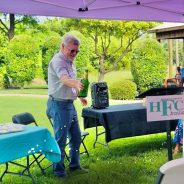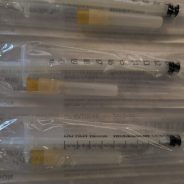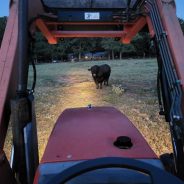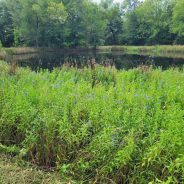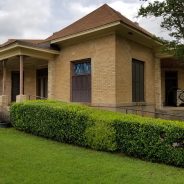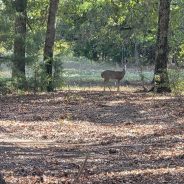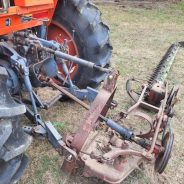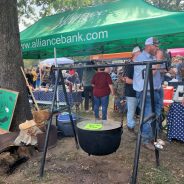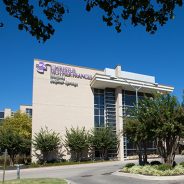Foundation Surpasses $1M Raised in FY25 Due to Generosity of Community
August 18, 2025 – Sulphur Springs, Texas – The Hopkins County Health Care Foundation is celebrating a milestone that has been 28 years in the making. Due to the donations and support of Hopkins County residents and businesses, the Foundation raised over $1 million in the first 10 months of the fiscal year 2024-25. Board members are eager to state that this is means more dollars that will be invested in local healthcare to benefit Hopkins County residents.
“This accomplishment was only possible due to the generosity of the community,” said Pam Black, chair of the Foundation Board of Directors. “The Health Care Foundation raises money that is then given back to the community through healthcare initiatives such as free clinics, education, improved facilities, and cutting-edge equipment. We believe that any support the Foundation receives enables medical professionals to save local lives. That is why we take our role in this process very seriously.”
The Foundation is known for some of the best fundraisers in Hopkins County, such as the annual Gala, Snowflake campaign, and bingo events such as Man Bingo and the upcoming Designer Handbag Bingo. But the group is most proud of the work the Foundation is able to accomplish due to the financial support received from the community.
Each year, the Foundation offers free clinics including a free mammography clinic for uninsured Hopkins County women and a free heart calcium scan clinic for Hopkins County men. The Foundation also provides In My Closet for the women’s cancer community. This includes free items to assist breast cancer patients and survivors, as well as the Hopkins County Breast Cancer Support Group.
“The more money we receive, the more we can invest locally in healthcare to benefit all of us,” stated Black. “Raising $1 million was a community-wide effort that will benefit all of us.” The Foundation also provides funds to two other local healthcare entities, the Hopkins County Hospital District/EMS and CHRISTUS Mother Frances Hospital – Sulphur Springs, to ensure that they have what they need to better serve Hopkins County.
Annually, the Foundation Board considers funding requests from these two organizations to determine which projects will have the most healthcare benefit for local residents. This may involve updating existing equipment, adding a machine to provide additional testing locally, or, as is currently the case, assisting with fundraising for a construction project.
This record year has highlighted the need to donate to the surgical wing expansion at CMF-SS. The generous gift from Sharon and Charles Helm to name and underwrite the four new operating rooms played a huge role in the Foundation’s fundraising success and will have a long-lasting impact on Hopkins County’s access to state-of-the-art surgical offerings.
In Fiscal Year 2025-26, the Foundation has already provided $12,500 to the Hopkins County Hospital District/EMS to be used for a whole blood initiative to help save lives prior to an ambulance arriving at the hospital. In February, the Foundation donated $260,000 toward an MRI upgrade that is already in use. The Foundation also facilitated a donation from Alliance Bank to purchase a golf cart for the Mobile Athletic Training Room used by CMF-SS. The golf cart will be on the sidelines at high school sporting and community events to assist trainers and medical staff in rendering aid.
Foundation Chair-Elect Steve Rutherford underscored why the Foundation exists. “The Foundation fills in the gaps to make sure that our rural community has the equipment, technology, and facilities necessary to provide us with as many opportunities to receive quality local care. The Foundation believes that choosing a great quality of life outside of an urban area should not negatively impact residents’ healthcare treatments and opportunities. Our community deserves great healthcare. We appreciate the individuals, organizations, and businesses that help us fulfill our mission.”
The Foundation is an IRS 501 (c) (3) non-profit organization; all or part of donations may be tax-deductible. Donors should consult their tax preparer for more information. Donors interested in learning more about the Foundation or the Spreading Our Wings Campaign, making a cash donation, including the Foundation in estate planning, or establishing a pledge may contact the Foundation at 903-438-4799 or [email protected].
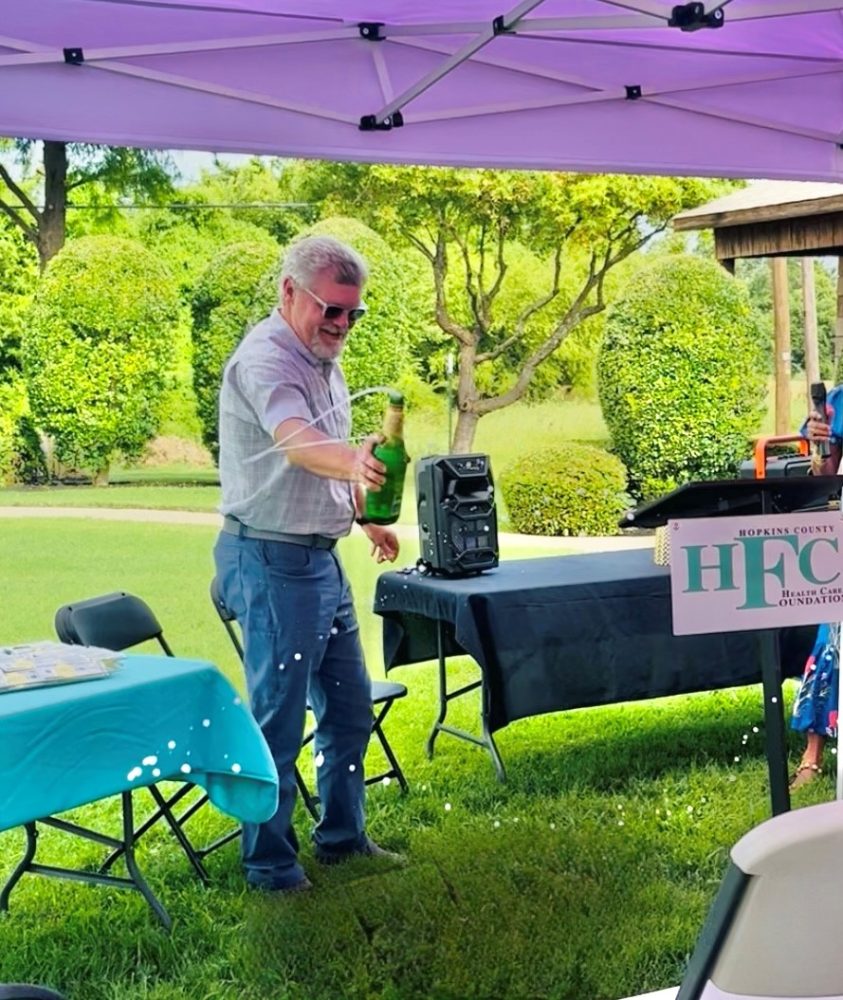
No celebration is complete without a spray of champagne, or in this case, grape juice. Foundation Chair-Elect Steve Rutherford turned the twist top after the announcement of the Health Care Foundation’s fundraising accomplishment.
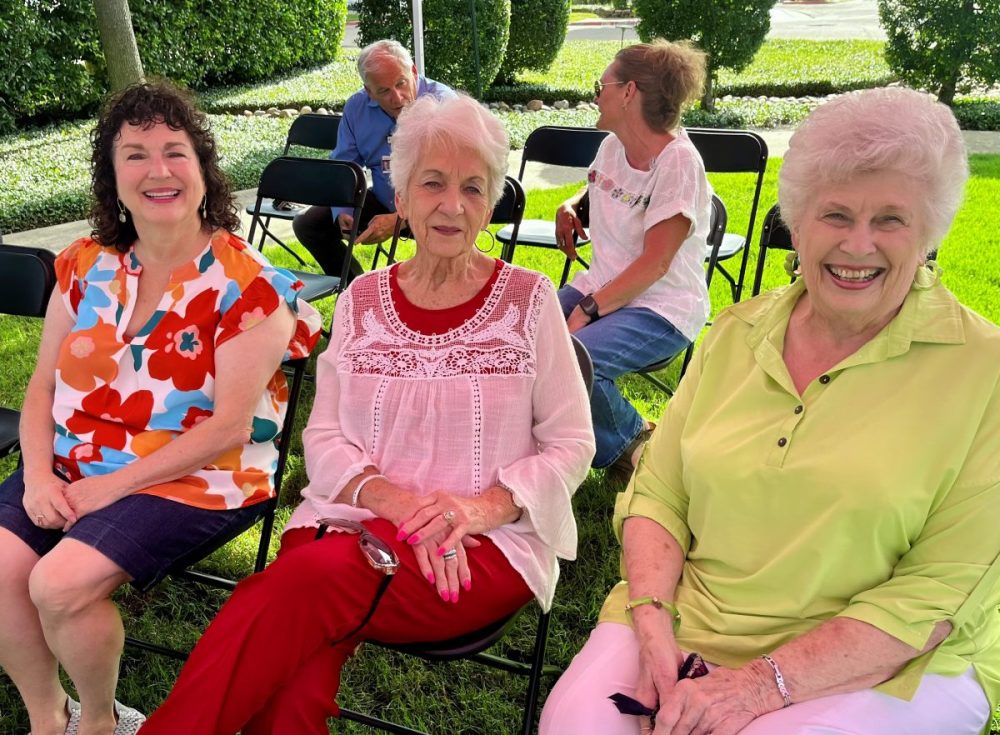
The Hopkins County Health Care Foundation Board of Directors has cause for celebration of FY 2024-25. Due to the generosity of Hopkins County residents, organizations, and businesses, the Foundation surpassed $1 million in funds raised during the first 10 months of last fiscal year. What that means for Hopkins County residents is that they will have even more local health-related opportunities! A win-win! Shown here are former Foundation Board Members, from left to right, Markeda Fisher, Wanda Galyean, and Lynda Hager.
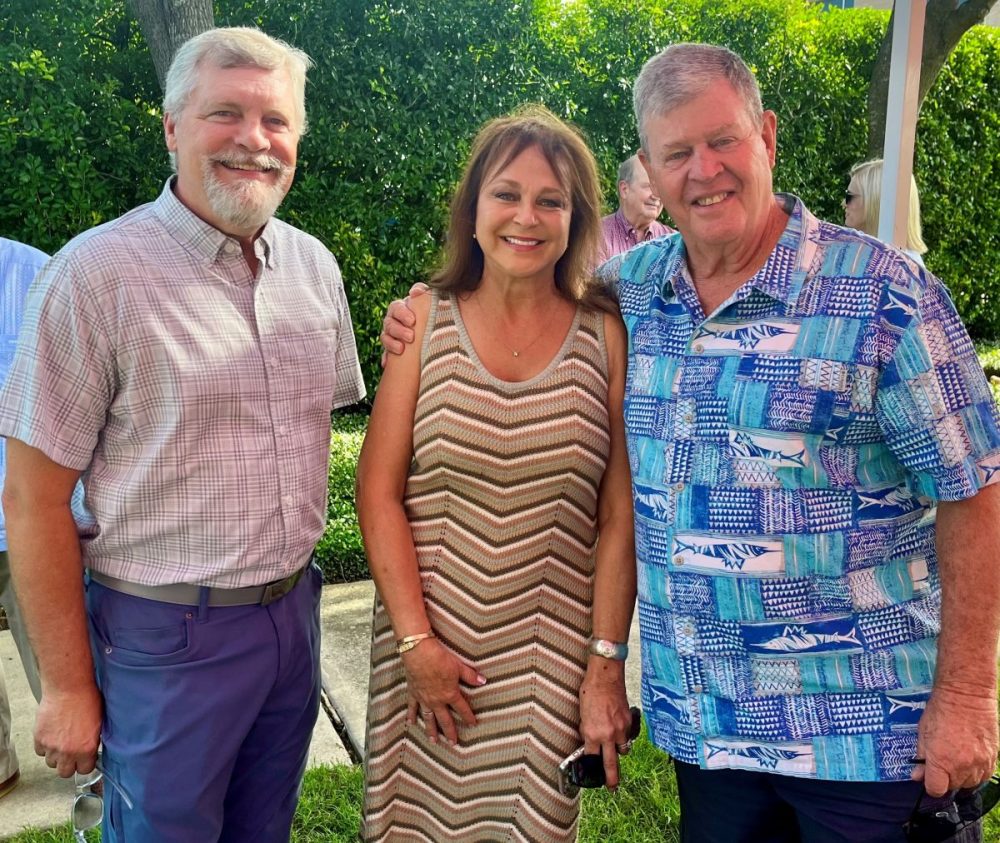
Current and former Health Care Foundation Board members and donors gathered to hear a surprise announcement 28 years in the making. Chair-Elect Steve Rutherford, Mary Heilman, and Jimmy Jones catch up prior to the reception.
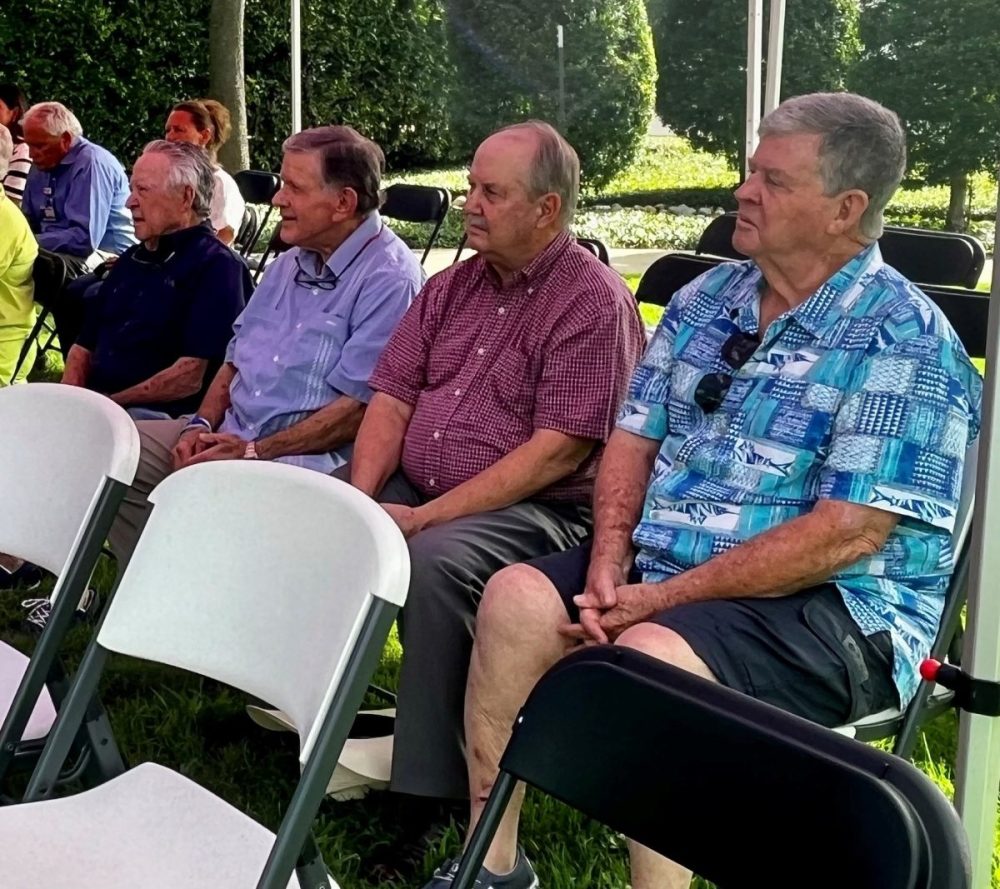
A healthy group of current and former Foundation board members gathered to hear the news. Initial Board Member, Dr. Bill Dietz, current Board Member Mickey McKenzie, former Board Member Tom Sellers, and former Board Member Jimmy Jones wait for the big announcement.
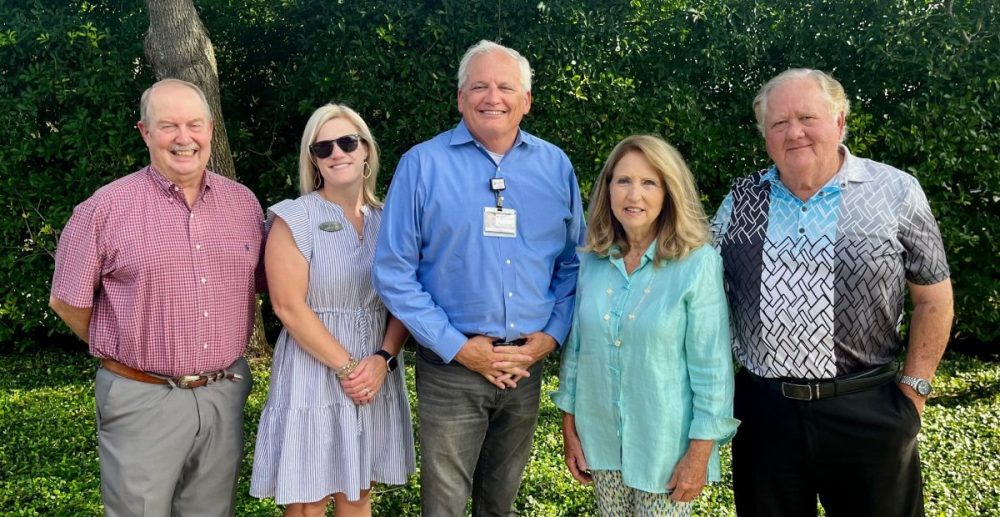
Current and former Foundation Board Members, left to right, Tom Sellers, Jessica Kultgen, Paul Harvey, Sharon Helm, and Charles Helm gather for a surprise announcement about the Hopkins County Health Care Foundation.
Texas DPS Unveils New, More Secure Driver’s License and ID Cards
August 19, 2025 – Starting this week, the Texas Department of Public Safety (DPS) is rolling out a new design for all driver’s licenses and state ID cards, aimed at enhancing security and deterring fraud.
The previously issued cards, with the current design, are still valid until their expiration date.
The updated cards include advanced security features, including laser-engraved text, tactile surfaces, and new ultraviolet elements that are nearly impossible to replicate. DPS officials say the changes are designed to make it much harder for counterfeiters to create fake Texas IDs.
“These new designs will help protect Texans from identity theft and keep our systems ahead of those trying to exploit them,” said a DPS spokesperson. “It’s all about ensuring trust in the integrity of our identification process.”
The new cards will also have an updated layout and design, including more prominent placement of personal information, and refreshed graphics showcasing Texas themes. The DPS noted that all existing cards will remain valid until their expiration date, so there’s no need for current cardholders to take immediate action.
The redesign is part of DPS’s ongoing efforts to improve public safety and comply with federal REAL ID Act standards. The department is encouraging Texans to verify their documents are current before traveling or updating ID-related records.

Texas Health Officials Declare End to 2025 Measles Outbreak
August 18, 2025 – The Texas Department of State Health Services (DSHS) has officially declared an end to the 2025 measles outbreak that affected communities across the state earlier this year. The outbreak resulted in 762 confirmed cases and two deaths, marking it as one of the most severe measles outbreaks in Texas in over a decade.
Health officials say no new cases have been reported for more than 42 days—the equivalent of two full measles incubation periods—meeting the criteria to declare the outbreak over. The outbreak began in January and spread rapidly across multiple counties, largely fueled by low vaccination rates in certain areas and international travel.
DSHS officials emphasized the importance of vaccination as the key defense against highly contagious diseases like measles. “This outbreak was preventable,” said DSHS Commissioner Jennifer Shuford. “Vaccination protects not just the individual, but entire communities—especially those who cannot be vaccinated due to medical reasons.”
The two deaths involved unvaccinated children with underlying health conditions, officials said.
In response to the outbreak, state and local health departments launched an aggressive campaign of contact tracing, vaccination clinics, and public education. Over 50,000 MMR vaccine doses were administered statewide during the response effort.
While the outbreak is officially over, DSHS urges families to ensure they are up to date on their vaccinations, especially ahead of the school year.

Abbott, USDA Secretary Rollins Announce $750 Million Screwworm Protection Facility in Texas
Austin, TX — August 15, 2025 — In a major step to safeguard American agriculture, Governor Greg Abbott and U.S. Secretary of Agriculture Brooke Rollins announced a $750 million federal investment to build a Domestic Sterile Screwworm Production Facility in Edinburg, Texas. The facility will combat the northward spread of the New World screwworm (NWS), a dangerous pest threatening U.S. livestock.
“Texas agricultural producers feed the world,” said Governor Abbott. “But the New World screwworm puts that at risk. This new facility will produce hundreds of millions of sterile flies to stop the pest’s spread and protect our food supply.”
The New World screwworm can devastate cattle and livestock by laying larvae in open wounds, leading to serious infections and death. While the U.S. currently relies on a production facility in Panama, this new facility will triple output, producing up to 300 million sterile flies per week—a first for domestic operations.
Secretary Rollins emphasized the urgency, citing the pest’s spread from Mexico. “President Trump has made it clear: We must protect our borders and our agriculture from foreign threats,” she said. “This is a national security issue.”
The Edinburg facility aims to strengthen the country’s ability to prevent future outbreaks and ensure food security. The project is supported by top Texas leaders, including Commissioner Sid Miller and members of the Texas Legislature.
In June, Governor Abbott also launched the Texas New World Screwworm Response Team, coordinating with state agencies to contain the pest.
Construction on the facility is expected to begin later this year, marking a pivotal move in fortifying America’s agricultural resilience.
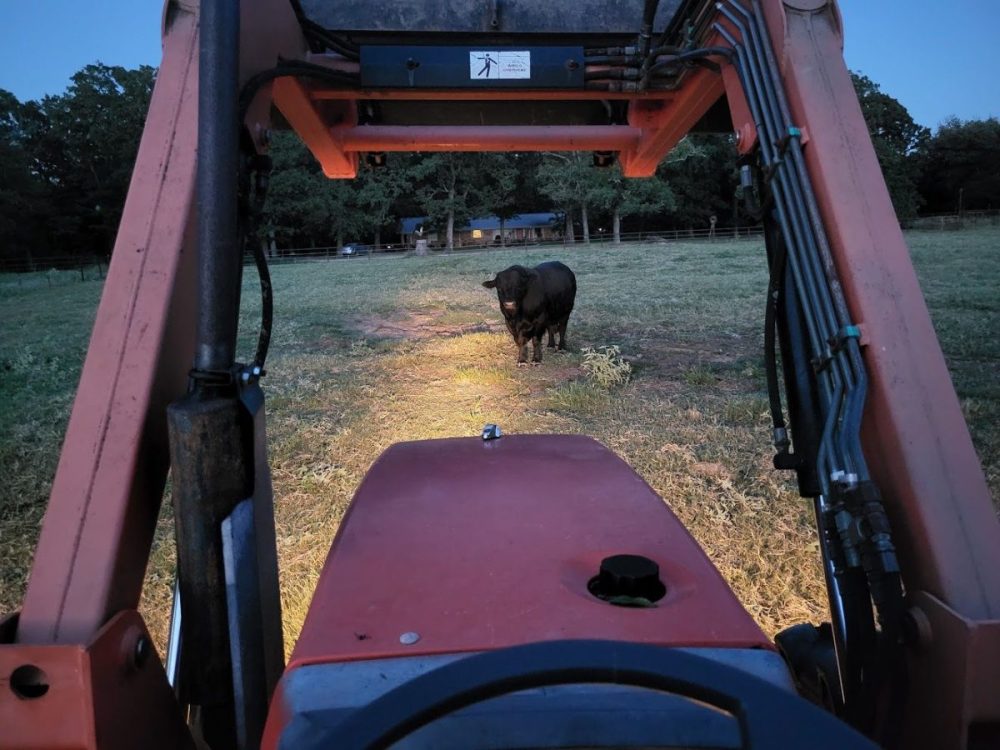
China Accounted for 8% of Foreign Buyers in Texas Real Estate Market Ahead of New Law
August 15, 2025 – Austin, TX — A new report by Texas Realtors shows that international real estate activity in Texas is on the rise, with foreign buyers purchasing more homes across the state in 2025. Overall, foreign residential property purchases increased by 9% compared to the previous year.
Mexican buyers led the way, accounting for 30% of international purchases, while both Canada and China each made up 8% of the market. The trend highlights Texas’s ongoing appeal to global investors, particularly in major metro areas like Houston, Dallas-Fort Worth, and Austin.
However, the international buyer landscape could shift dramatically in the coming months. A new Texas state law, set to take effect on September 1, will ban the sale of Texas residential, agricultural, commercial, and industrial land to citizens of countries classified as national security threats. These designations are determined by either the U.S. Director of National Intelligence or the Governor of Texas.
While the law does not specifically name China, the country is frequently cited in national security discussions, raising questions about how the measure could impact future property transactions involving Chinese nationals.
Supporters of the law say it protects Texas land and resources from foreign influence. Critics argue it could damage international investment and strain diplomatic relationships. As the law takes effect, real estate professionals and foreign investors alike are watching closely to see how enforcement will unfold.
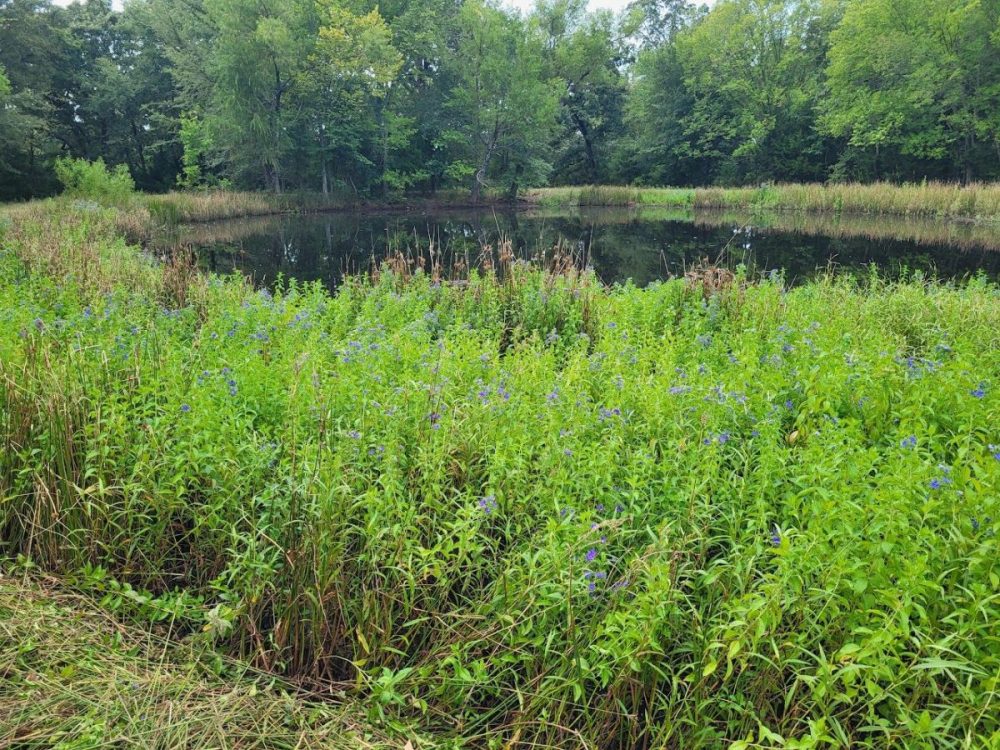
Hopkins County Genealogical Society Hosts Joint Meeting
August 14, 2025 – It is that time of year again! In August of each year, the Hopkins County Genealogical Society and the Hopkins County Historical Society hold a joint meeting. This meeting is in lieu of the regular monthly meeting for HCGS, which is usually held on the 3rd Thursday of each month. So, please note carefully the change in the date and time for this meeting………………………
On Thursday, August 28th, 2025, at 6:30 p.m., in the Winniford Building at Heritage Park, 416 Jackson St., Sulphur Springs, Texas, Paula Altenbaumer will portray Sulphur Springs born Native American, Sophia Alice Callahan. Sophia was born in Sulphur Springs January 1, 1868 and died in Muskogee, Oklahoma January 7, 1894. She is thought to be the first Native American to publish a book.
This is a free event and everyone is welcome! Paula is an active member and volunteer with both the Hopkins County Genealogical Society and the Hopkins County Historical Society. She has taken on the persona of many Hopkins County pioneers over the years and has never failed to deliver a delightful presentation. We look forward to seeing you there.
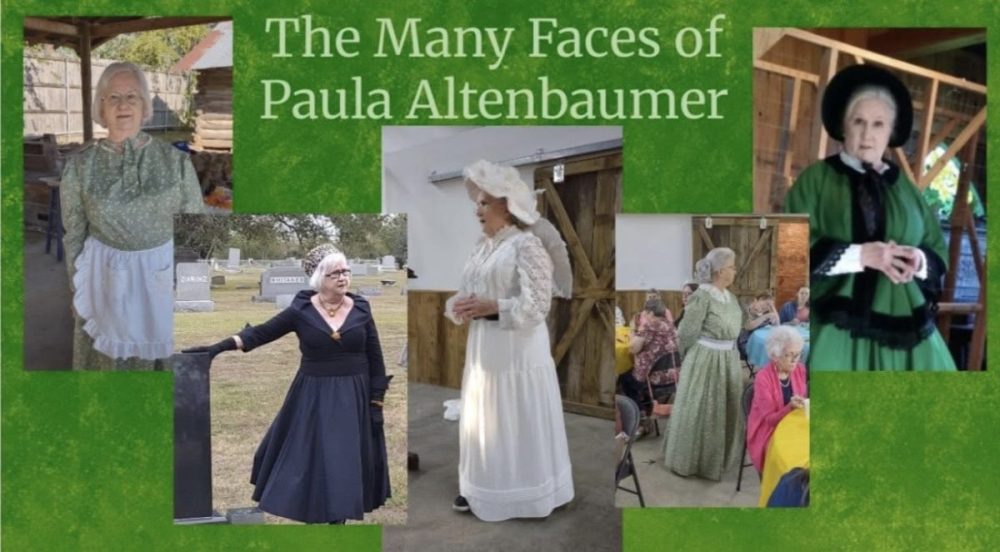
Texas Game Wardens Near Conclusion of ‘Ghost Deer’ Case with 24 Suspects, 1,400 Charges Filed Statewide
Aug. 14, 2025 – AUSTIN – The Texas Game Warden investigation known as “Ghost Deer” has reached a possible conclusion after two additional suspects turned themselves in on felony charges. This brings the total number of individuals implicated in the case to 24, with approximately 1,400 charges filed across 11 Texas counties.
Ken Schlaudt, 64, of San Antonio, the owner of four deer breeding facilities and one release site, along with facility manager Bill Bowers, 55, of San Angelo, surrendered to the Travis County District Attorney’s Office on charges of felony tampering with a governmental record. Both men allegedly entered false information into the Texas Wildlife Information Management System (TWIMS) to facilitate illegal smuggling of white-tailed breeder deer. They also face more than 100 misdemeanor charges related to unlawful breeder deer activities in Tom Green County.
The “Ghost Deer” investigation has uncovered widespread, coordinated deer breeding violations including, but not limited to: smuggling captive breeder deer and free-range whitetail deer between breeder facilities and ranches, Chronic Wasting Disease (CWD) testing violations, license violations and misdemeanor and felony drug charges relating to the possession and mishandling of prescribed sedation drugs classified as controlled substances.
The suspects charged in the case include:
- Evan Bircher, 59, San Antonio
- Vernon Carr, 55, Corpus Christi
- Jarrod Croaker, 47, Corpus Christi
- Terry Edwards, 54, Angleton
- Joshua Jurecek, 41, Alice
- Justin Leinneweber, 36, Orange Grove
- James Mann, 53, Odem
- Gage McKinzie, 28, Normanna
- Herbert “Tim” McKinzie, 47, Normanna
- Eric Olivares, 47, Corpus Christi
- Bruce Pipkin, 57, Beaumont
- Dustin Reynolds, 38, Robstown
- Kevin Soto, 55, Hockley
- Jared Utter, 52, Pipe Creek
- Reed Vollmering, 32, Orange Grove
- Clint West, 56, Beaumont
- James Whaley, 49, Sevierville, Tenn.
- Ryder Whitstine, 19, Rockport
- Ryker Whitstine, 21, Rockport
- Claude Wilhelm, 52, Orange
Cases are pending adjudication in Bandera, Bee, Brazoria, Duval, Edwards, Jim Wells, Live Oak, Montgomery, Tom Green, Travis and Webb counties.
The investigation began in March 2024 when game wardens discovered the first violations during a traffic stop. That incident led wardens to the much larger network of violations, resulting in one of the largest deer smuggling operations in Texas history.
About Texas Game Wardens
Texas Game Wardens, within the Law Enforcement Division of Texas Parks and Wildlife Department, are responsible for enforcing laws related to the conservation and management of natural resources and public safety through community-based law enforcement. Their mission is to provide hunting, fishing and outdoor recreation opportunities for the use and enjoyment of present and future generations. Additionally, they play a crucial role in search and rescue operations during natural disasters, exemplifying their commitment to protecting both the environment and the people of Texas.
If you witness a fishing, wildlife or boating violation in progress, please call 1-800-792-GAME (4263) immediately and report it to Operation Game Thief (OGT), Texas’ Wildlife Crime-Stoppers Program. You can also text your tip by sending the keyword TXOGT plus your tip to 847411 or through the Texas OGT App, available for iOS and Android devices. Dispatchers are available 24/7.

Texas Agriculture Commissioner Sid Miller Applauds EPA Action to End Harmful Diesel Exhaust Fluid Shutdowns
August 15, 2025 – AUSTIN – Texas Agriculture Commissioner Sid Miller today praised the U.S. Environmental Protection Agency (EPA) for their decisive action in issuing new guidance that protects farmers, truckers, and other diesel equipment operators from sudden speed and power losses caused by diesel exhaust fluid (DEF) systems without compromising environmental protection standards.
What is DEF?
- DEF is a non-toxic solution of urea and deionized water injected into the exhaust stream of diesel vehicles.
- It works with the Selective Catalytic Reduction (SCR) system to reduce harmful nitrogen oxide (NOx) emissions.
- Without DEF, a diesel vehicle would not meet federal emissions standards, and the engine might not start.
“For years, I’ve heard from Texas farmers, ranchers, and truckers who have been sidelined by ridiculous DEF shutdowns in the middle of planting, harvest, or hauling,” Commissioner Miller said. “This nonsense has cost our producers time, money, and peace of mind. This decision by Administrator Zeldin is a victory for common sense and yet another sign that, under President Trump, Washington is finally listening to rural America.”
What happens when DEF runs out?
- Modern diesel vehicles are equipped with systems that monitor DEF levels.
- If DEF is low, the vehicle’s performance may be reduced through a “derate” process, limiting speed or power.
- In the past, running out of DEF could lead to sudden and complete engine shutdowns, which was problematic for farmers, truckers, and other businesses.
The announcement, made by EPA Administrator Lee Zeldin alongside U.S. Small Business Administrator Kelly Loeffler at the Iowa State Fair, directs engine and equipment manufacturers to revise DEF system software in existing vehicles and equipment. This update will prevent abrupt shutdowns and give operators more time to address maintenance needs—ensuring productivity and safety in the field and on the road.
Current DEF shutdown rules are estimated to cost family farms and small businesses roughly $727 million annually through lost productivity, repair and service expenses, missed deadlines, penalties for late deliveries, and crop quality losses when harvest windows are missed.
“Texas agriculture runs on hard work and diesel power, not government red tape,” Miller added. “This action will strengthen the economy of rural Texas and finally give our farmers and ranchers the relief they’ve been asking for. This new EPA guidance will save farmers millions, prevent costly equipment shutdowns, and keep Texas agriculture moving forward.”
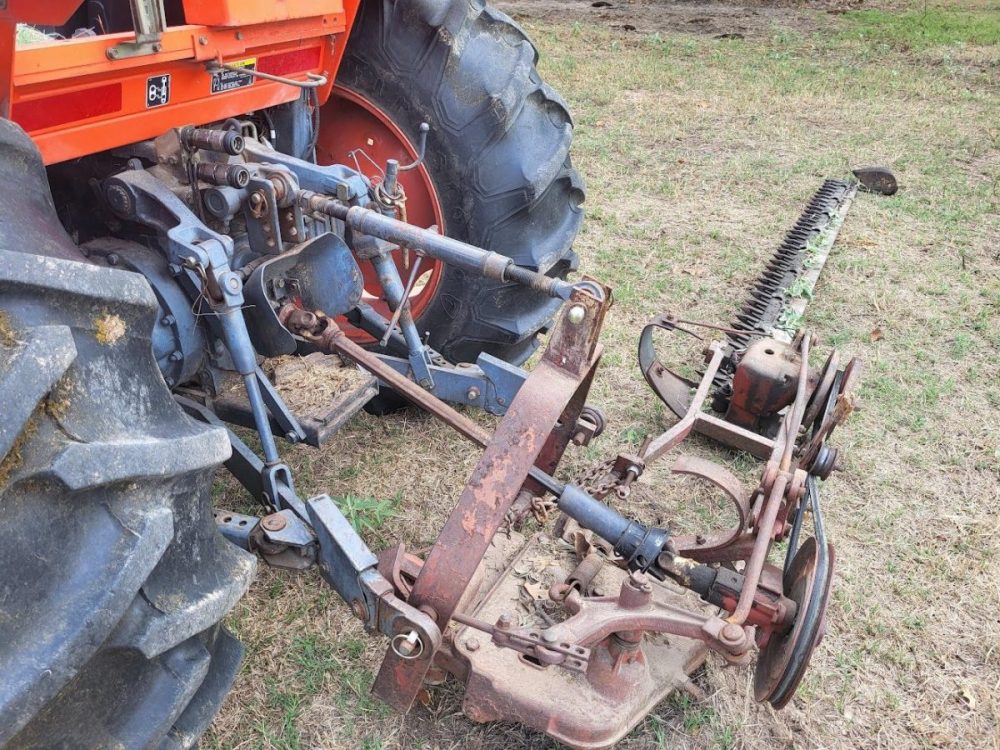
Stewcomers Meeting This Month
August 14, 2025 – Who’s ready Stewcomers!?
If this is your first year cooking at the Hopkins County Stew Festival or wanting to learn more-we’ve got you covered!
Join us for a First-Time Cooks Meeting this Tuesday, August 26th at 5:30 PM at the Chamber Office on Main.
We’ll walk you through everything you need to know so your debut is a delicious success.
See you soon, stew lovers…
Chamber address: 110 Main Street, Sulphur Springs, TX 75482
The annual World Champion Hopkins County Stew Contest will take place Saturday October 25, 2025 here in Sulphur Springs.
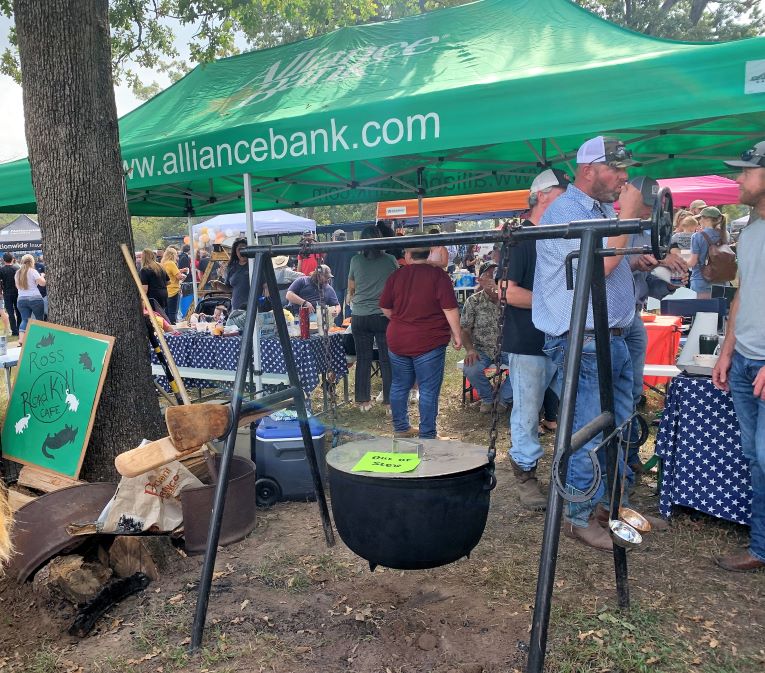
CHRISTUS-Sulphur Springs Honored for Excellence in Stroke Care
CHRISTUS Trinity Mother Frances Health System receives national award for comprehensive stroke care
Hospitals in Jacksonville, Sulphur Springs, Tyler recognized for excellence in stroke care
(TYLER, Texas) – Three hospitals in the CHRISTUS Trinity Mother Health System have been nationally recognized by the American Heart Association and American Stroke Association for delivering high-quality stroke care.
The national award, Get With The Guidelines – Stroke, is given to hospitals that have demonstrated excellence in stroke care. The recognition was created to highlight the health care facilities providing the most up-to-date, research-based guidelines and quick recovery times.
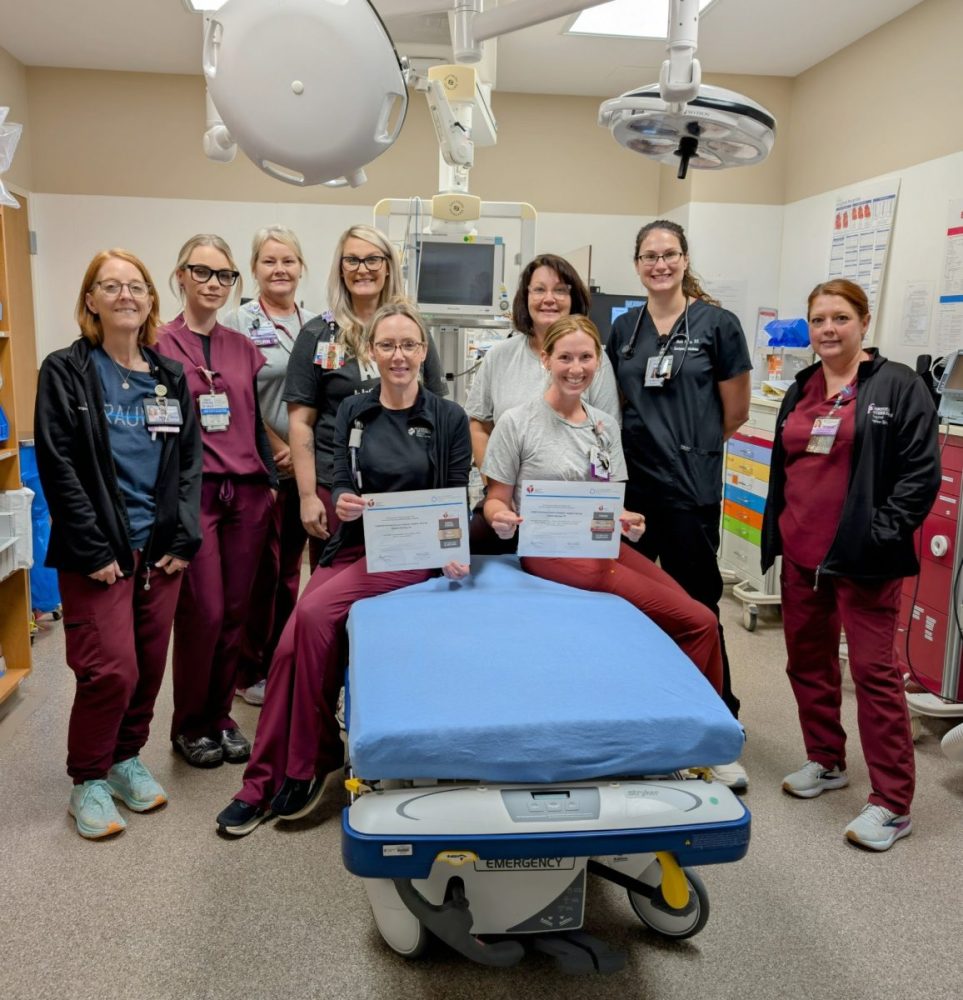
• CHRISTUS Mother Frances Hospital – Jacksonville received Stroke Silver Plus and Stroke Honor Roll
• CHRISTUS Mother Frances Hospital – Sulphur Springs received Stroke Gold Plus, Stroke Honor Roll Elite and Type 2 Diabetes Honor Roll
• CHRISTUS Mother Frances Hospital – Tyler received Stroke Gold Plus, Stroke Honor Roll Elite Plus and Type 2 Diabetes Honor Roll
“These honors are a testament to the dedication of our teams that continuously strive to achieve the best possible outcomes for our patients,” said Jennifer Burwell, stroke program manager at CHRISTUS Mother Frances Hospital – Tyler. “We are proud of this recognition and remain focused on pushing the standard of care even higher.”
All three CHRISTUS Trinity Mother Frances Health System hospitals underwent a rigorous evaluation process to receive this designation. They demonstrated excellence in timely stroke intervention, adherence to national treatment guidelines and providing patients with education to support recovery and long-term health.
“As a rural critical access hospital, this award demonstrates the devotion of the entire team at CHRISTUS Jacksonville to bring prime health care specialty services to the residents of Cherokee County and the surrounding areas,” said Dwain Coates, stroke coordinator at CHRISTUS Mother Frances Hospital – Jacksonville.
Every 40 seconds, someone in the U.S. has a stroke and about every three minutes someone dies from one, according to the U.S. Centers for Disease Control and Prevention. Stroke remains a leading cause of death and long-term disability in the U.S.
A stroke occurs when a blood vessel carrying oxygen and nutrients to the brain is blocked by a clot or ruptures, cutting off the supply to brain tissue. When this happens, parts of the brain cannot get the blood and oxygen needed, causing brain cells to die.
Knowing the symptoms and being able to react as quickly as possible to a stroke is crucial to help minimize the long-term effects of a stroke and even prevent death, said Kala Anders, stroke program manager at CHRISTUS Mother Frances Hospital – Sulphur Springs.
The easiest way to recognize stroke symptoms is the acronym BE FAST:
• B: Balance – Is there a sudden loss of balance or coordination?
• E: Eyes – Is there sudden blurred or double vision?
• F: Face – Ask the person to smile. Does one side of their face droop?
• A: Arm – Ask the person to raise both arms. Does one arm drift downward?
• S: Speech – Ask the person to repeat a simple phrase. Is their speech slurred or strange?
• T: Time – If you observe any of these signs, call 911 immediately, as time is very important.
“Earning these awards provides confidence in the medical care that you can expect from any CHRISTUS facility,” Anders said. “These recognitions solidify that exemplary clinical stroke care and evidence-based, innovative treatment can be and is being provided to the people from the urban areas to the most rural areas all over Northeast Texas.”


